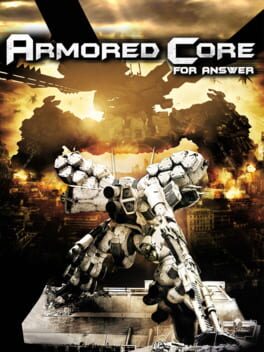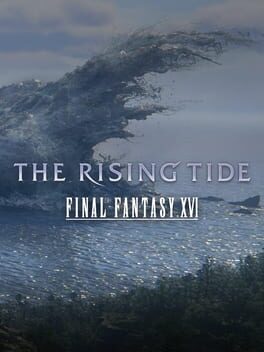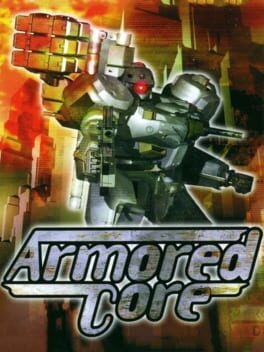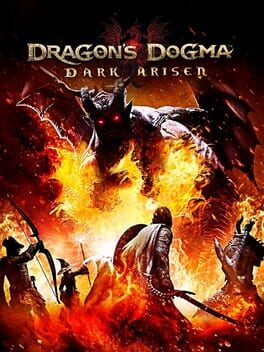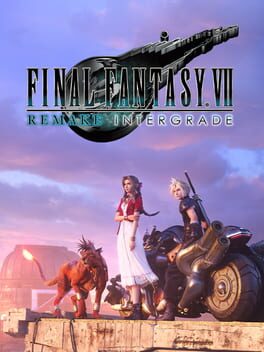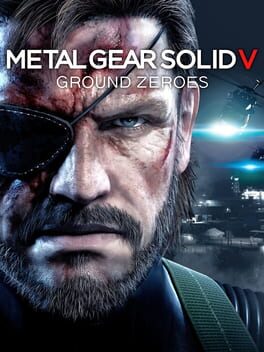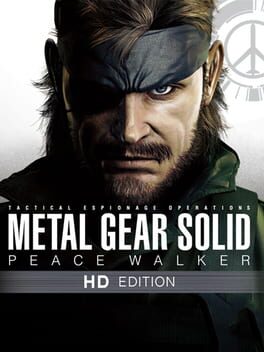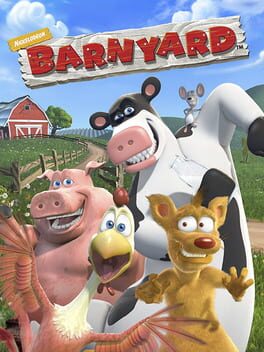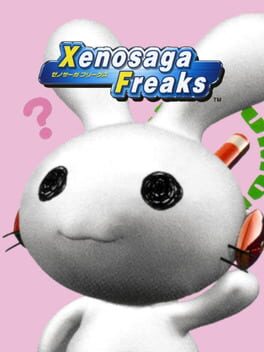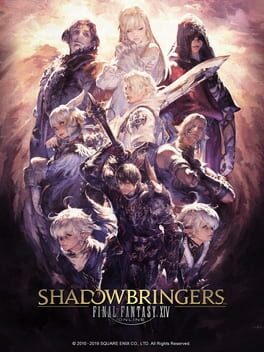Celicesama
This review contains spoilers
This'll mostly be a review of the story.
To be clear, I think Armored Core 4 was an aggressively mid game. A mid game with interesting foundations, but a mid game nonetheless. Everything from its mechanics to its story were major nothingburgers that stand out among not just this franchise, but the catalog of one of our medium's most storied directors. While iffy on a lot of For Answer at first, to say this game grew on me would be an understatement. I've nearly completed it 5 times at this point, finished every mission on normal and may return to finish everything on hard. Great and fun game.
I think the thing that 4A consistently does better than even the great works that Miyazaki would go on to direct would be the feeling of dread present. Miyazaki's games are known for their dread, but all with a tinge of hope as to not feel completely devoid; I think someting like Bloodborne stands as an example of this, and a game more hopeful than most give it credit for. While 4A does retain this lingering sense of hope, he hadn't quite found his footing as far as organically weaving it into the narrative.
For Answer is, however, the master of the simultaneous desolation and sentimentality that characterizes Miyazaki's style. His Ueda influences are as clear as ever, with the giant, spectacular Arms Fort fights, the meditative nature of the setting, and Kota Hoshino's complementary OST feeding into the quietude and desolation that Miyazaki so loves to imitate and integrate.
Nowhere is the dread more present in For Answer as it is in the game's endings. While I wish at least one of the final bosses was good or fun, I think the endings prove better than anything the sheer uncompromising and unforgiving nature of For Answer's world. It's a giant, massive allegory for Thompson's trolley problem. You can imagine just how much pressure weighs on the shoulders of Thermidor and Wynne D.
"Is this really my fate? To lose... everything?"
"To treasure a life... is that something to laugh at?"
"You think it's your right to choose who lives and dies?"
It's much harder to be a good, or event a decent person than to be a bad one, and nowhere is it more evident with not only the aforementioned two, but yourself as well. You can imagine just how much pressure even living in a world as hopeless as this is putting on Strayed. It's a wonder they didn't break sooner than they did prior to siding with Old King, like an actual genuine marvel of human willpower, and it's also even more disheartening to know that "Destroy Cradle 03" is probably the easiest mission in the whole game. Strayed breaks under pressure and decides "fuck it lmao" and takes the easy way out: to fight for absolutely nothing whatsoever, for the world is fucked either way. I can respect idealists like Wynne D and Thermidor (and hell, even Old King to a certain extent) because they at least tried to fight for what they believed was right, even if, as per Thompson, the only options were to kill or let die (or whatever the hell the Closed Plan was). I finished the third ending instilled with a sense of dread (and frustration at Arteria Carpals), knowing that no matter what, this world is doomed, and that Strayed fought for absolutely nothing in the end. An ironic twist on the platonic ideal of the Raven that is so pushed in the series, even more so if you have the WG core equipped in that final cutscene: Strayed flies off into the sunset on a pair of false raven wings to bring death to billions for no good reason.
Then the game takes you to credits, in which you hear the title screen theme: 'Someone is Always Moving on the Surface'. An apt description of what I took away from this game. Dim as it may be, the faint hope that is so characteristic of Miyazaki's style prevails. Despite the plague, famine, and desolation that has befallen Earth, someone is always moving on the surface.
"Is that your answer? So be it..."
To be clear, I think Armored Core 4 was an aggressively mid game. A mid game with interesting foundations, but a mid game nonetheless. Everything from its mechanics to its story were major nothingburgers that stand out among not just this franchise, but the catalog of one of our medium's most storied directors. While iffy on a lot of For Answer at first, to say this game grew on me would be an understatement. I've nearly completed it 5 times at this point, finished every mission on normal and may return to finish everything on hard. Great and fun game.
I think the thing that 4A consistently does better than even the great works that Miyazaki would go on to direct would be the feeling of dread present. Miyazaki's games are known for their dread, but all with a tinge of hope as to not feel completely devoid; I think someting like Bloodborne stands as an example of this, and a game more hopeful than most give it credit for. While 4A does retain this lingering sense of hope, he hadn't quite found his footing as far as organically weaving it into the narrative.
For Answer is, however, the master of the simultaneous desolation and sentimentality that characterizes Miyazaki's style. His Ueda influences are as clear as ever, with the giant, spectacular Arms Fort fights, the meditative nature of the setting, and Kota Hoshino's complementary OST feeding into the quietude and desolation that Miyazaki so loves to imitate and integrate.
Nowhere is the dread more present in For Answer as it is in the game's endings. While I wish at least one of the final bosses was good or fun, I think the endings prove better than anything the sheer uncompromising and unforgiving nature of For Answer's world. It's a giant, massive allegory for Thompson's trolley problem. You can imagine just how much pressure weighs on the shoulders of Thermidor and Wynne D.
"Is this really my fate? To lose... everything?"
"To treasure a life... is that something to laugh at?"
"You think it's your right to choose who lives and dies?"
It's much harder to be a good, or event a decent person than to be a bad one, and nowhere is it more evident with not only the aforementioned two, but yourself as well. You can imagine just how much pressure even living in a world as hopeless as this is putting on Strayed. It's a wonder they didn't break sooner than they did prior to siding with Old King, like an actual genuine marvel of human willpower, and it's also even more disheartening to know that "Destroy Cradle 03" is probably the easiest mission in the whole game. Strayed breaks under pressure and decides "fuck it lmao" and takes the easy way out: to fight for absolutely nothing whatsoever, for the world is fucked either way. I can respect idealists like Wynne D and Thermidor (and hell, even Old King to a certain extent) because they at least tried to fight for what they believed was right, even if, as per Thompson, the only options were to kill or let die (or whatever the hell the Closed Plan was). I finished the third ending instilled with a sense of dread (and frustration at Arteria Carpals), knowing that no matter what, this world is doomed, and that Strayed fought for absolutely nothing in the end. An ironic twist on the platonic ideal of the Raven that is so pushed in the series, even more so if you have the WG core equipped in that final cutscene: Strayed flies off into the sunset on a pair of false raven wings to bring death to billions for no good reason.
Then the game takes you to credits, in which you hear the title screen theme: 'Someone is Always Moving on the Surface'. An apt description of what I took away from this game. Dim as it may be, the faint hope that is so characteristic of Miyazaki's style prevails. Despite the plague, famine, and desolation that has befallen Earth, someone is always moving on the surface.
"Is that your answer? So be it..."
1997
2023
This review contains spoilers
Judging purely off of what this game gave me to think about and analyze, this has been one of the most thrilling experiences so far this year. XVI is a fascinating game and I think that's a feeling that always permeated throughout my playthrough. Sometimes the game will do something that perks my ears up and genuinely impresses me, and sometimes the game throws something at me so baffling that I can't even begin to comprehend that this team is the same that did Shadowbringers and Endwalker.
Before digging deep into why I feel this way, I want to say that first and foremost: XVI is a Final Fantasy game without a doubt in my mind. Is it an RPG in a traditional sense? Maybe not, but at least on a superficial level, the art direction, world, and especially the soundtrack exude a feeling not to dissimilar to how, say, FFXII made me feel.
Speaking of FFXII, I think that game is probably the one that XVI shares the most similarity to, largely attributed to Kazutoyo Maehiro, XII's combat designer, as the main writer. I have yet to play any other Ivalice game other than XII, but based of that and Heavensward, I'd say I'm a pretty decent fan of what Maehiro has done for the franchise in general. Heavensward was the expansion that made me fall in love with FFXIV, surprising me with just how cohesive and mature it was. I was hoping to get something similar out XVI's story, with it being advertised as more mature with the characters saying "fuck" every 5 goddamn seconds, as well as the game's fair share of nudity every now and then.
While I admire the game's sense of almost aggressive thematic cohesion with how it presents its world to us (with annoying, pacebreaking town quests), I just found the narrative to be very amateurish and barebones. FFXVI's story is an example of a young teen writer who thinks nudity and swears immediately make a story more mature (it does not), and that vibe kinda unfortunately sticks through a lot of the game. A story isn't immediately more mature just because characters have their tits or cock out and start spamming swears in chat like it's CoD. Rather, it's the reverse; I think more mature stories have to earn moments of intimacy (or the right to say fuck, idk).
The almost paradoxically ironic lack of maturity in conjunction with XVI's approach to theming (again, dumb town quests) really give the sense that the writers are struggling with how they want this game to come off tonally, even if it is fairly thematically consistent. I struggle to discern whether this game is a mature, medievalesque dark fantasy with posh-sounding characters, political intrigue (false as it may be), and sexual themes, or a rah-rah shonenesque power fantasy about the power of friendship and the importance of bonds. Undoubtedly its the latter, but I wish the game had just committed to that feel instead of lulling us into making us thinking it's more mature than it actually is. It makes those more conventionally mature scenes feel unwarranted, not only because they clash with the game's vision, but because the game could never commit to them to make them feel warranted to begin with.
Take Benedikta for example, who had all the makings of a fantastic character. The game almost explicity shows us that she was a rape victim, one who was miraculously granted the power of an Eikon, now holding a high position in the Kingdom of Waloed and exerting power over those below her, though her trauma and love for Cid continue to haunt her in spite of it all; she reminds me a lot of Ramsus from Xenogears in that regard. Now, could the game have kept her as a recurring antagonist, and as a result, exploring her trauma and relationships to a greater degree? Yes, but instead they sacrificed her for the sake of Clive's new powerup and a cool spectacle fight (it wasn't even that good tbh). It makes a lot of what they did show us, from her trauma to her intimate moment with Barnabas feel kinda... pointless? Nothing exasperates this more than when the game showed her again when Hugo was going through his thing with the crystal. It shows her NUDE for basically no other purpose than just to be nude. It comes off with all the weight and impact of thirteen y/o kids giggling when someone just so happens to have the nickname "dick", or when the teacher starts talking about sexual anatomy in class.
The tonal imbalance really hurts the story because it makes it difficult to get behind the aspects of its narrative that are actually decidedly mature, like the trauma of Clive and Jill, Anabella's ravaging of Rosaria, and with the advent of the Rising Tide DLC, the whole shtick with the baby and how cruelly they were treated by their ancestors. The game's story in that sense reminds me a lot of God of War Ragnarok's, where it feels like its more a caricature of a mature, well-written story as opposed to actually being one. It's "mature" in all the ways that would appeal to someone who gives little consideration to the things I had mentioned, but never in the ways that are important to my tastes and what I want out of similarly mature stories. It feels manufactured to be touching, heartfelt, and mature narrative, the gaming equivalent of Oscarbait essentially, but for me, it never earned that status. I guess that's just a me problem.
I went all this time without talking about the gameplay, which I find to be pretty good and honestly the most enjoyable part of the game. I've never played DMC so I can't make comparisons to Ryota Suzuki's work in those games, but I adore the gameplay in Dragon's Dogma and was hoping for something somewhat similar out of XVI. Different as it was, I still found it similarly enjoyable, if a bit easy. The difficult I find strange, because I don't really know how they could've made it harder aside from giving the enemies more damage and health. The movesets are usually fun to deal with, the basic gameplay loop of staggering your enemy and timing your cooldowns is always fun to execute. I don't really have that many criticisms for the combat itself aside from difficulty, and even then some bosses like Barnabas and Omega were fairly difficult and took a lot out of me.
My main issues are with the gear system and itemization, which I find really uninventive and kinda pointless. Clive's swords and armor are just all the same in terms of combat ability, with their only difference being in design and availability. It's unfortunate because gear is one of the most important tenets of RPG design, dictating the player's knowledge of a game's systems, and here it just feels shallow as hell. Really, only the rings have bearing on your playstyle, and I'll be totally fair, they are pretty interesting.
The skill system is cool though, and I love how you can mix and match different Eikon abilities to craft a playstyle that is right for you. While the game never emulated FFV's sheer variety like the devs had wanted, the Eikon abilities were just fun and varied enough to where I never got bored of checking them out every now and then. Odin I found particularly fun and I love how he fundamentally changes your playstyle. As someone who has Odin as their favorite recurring FF summon, I am satisfied.
The Eikon fights are probably this game's biggest highlights. Hot take, but I find them just kinda okay. Mechanically they're fine, with Ifrit's attacks feeling weighty, and they do get mechanically interesting from time to time. I just feel that for how bloated some of their healthpools are, I'm not content with winning just by hitting two buttons and seeing numbers pop up on the screen. I won't deny how great the presentation is, but even Bahamut and Titan, who are among the best presented bosses I've seen in gaming, are just kinda mechanical snoozefests that never stimulated me in any way that was memorable.
This is probably a good place to end. I came out of this game content with what it was and what it was trying to say, but to say that it resonated with me deeply or touched my soul would be a gross overstatement. A shame because with just a few tweaks to its writing and gameplay, it could've been something so so special. It lives and dies by the series' identity and is a Final Fantasy game through and through, but I never found myself moved by it in the same way a lot of my favorites from the series have. Overall, good game.
Before digging deep into why I feel this way, I want to say that first and foremost: XVI is a Final Fantasy game without a doubt in my mind. Is it an RPG in a traditional sense? Maybe not, but at least on a superficial level, the art direction, world, and especially the soundtrack exude a feeling not to dissimilar to how, say, FFXII made me feel.
Speaking of FFXII, I think that game is probably the one that XVI shares the most similarity to, largely attributed to Kazutoyo Maehiro, XII's combat designer, as the main writer. I have yet to play any other Ivalice game other than XII, but based of that and Heavensward, I'd say I'm a pretty decent fan of what Maehiro has done for the franchise in general. Heavensward was the expansion that made me fall in love with FFXIV, surprising me with just how cohesive and mature it was. I was hoping to get something similar out XVI's story, with it being advertised as more mature with the characters saying "fuck" every 5 goddamn seconds, as well as the game's fair share of nudity every now and then.
While I admire the game's sense of almost aggressive thematic cohesion with how it presents its world to us (with annoying, pacebreaking town quests), I just found the narrative to be very amateurish and barebones. FFXVI's story is an example of a young teen writer who thinks nudity and swears immediately make a story more mature (it does not), and that vibe kinda unfortunately sticks through a lot of the game. A story isn't immediately more mature just because characters have their tits or cock out and start spamming swears in chat like it's CoD. Rather, it's the reverse; I think more mature stories have to earn moments of intimacy (or the right to say fuck, idk).
The almost paradoxically ironic lack of maturity in conjunction with XVI's approach to theming (again, dumb town quests) really give the sense that the writers are struggling with how they want this game to come off tonally, even if it is fairly thematically consistent. I struggle to discern whether this game is a mature, medievalesque dark fantasy with posh-sounding characters, political intrigue (false as it may be), and sexual themes, or a rah-rah shonenesque power fantasy about the power of friendship and the importance of bonds. Undoubtedly its the latter, but I wish the game had just committed to that feel instead of lulling us into making us thinking it's more mature than it actually is. It makes those more conventionally mature scenes feel unwarranted, not only because they clash with the game's vision, but because the game could never commit to them to make them feel warranted to begin with.
Take Benedikta for example, who had all the makings of a fantastic character. The game almost explicity shows us that she was a rape victim, one who was miraculously granted the power of an Eikon, now holding a high position in the Kingdom of Waloed and exerting power over those below her, though her trauma and love for Cid continue to haunt her in spite of it all; she reminds me a lot of Ramsus from Xenogears in that regard. Now, could the game have kept her as a recurring antagonist, and as a result, exploring her trauma and relationships to a greater degree? Yes, but instead they sacrificed her for the sake of Clive's new powerup and a cool spectacle fight (it wasn't even that good tbh). It makes a lot of what they did show us, from her trauma to her intimate moment with Barnabas feel kinda... pointless? Nothing exasperates this more than when the game showed her again when Hugo was going through his thing with the crystal. It shows her NUDE for basically no other purpose than just to be nude. It comes off with all the weight and impact of thirteen y/o kids giggling when someone just so happens to have the nickname "dick", or when the teacher starts talking about sexual anatomy in class.
The tonal imbalance really hurts the story because it makes it difficult to get behind the aspects of its narrative that are actually decidedly mature, like the trauma of Clive and Jill, Anabella's ravaging of Rosaria, and with the advent of the Rising Tide DLC, the whole shtick with the baby and how cruelly they were treated by their ancestors. The game's story in that sense reminds me a lot of God of War Ragnarok's, where it feels like its more a caricature of a mature, well-written story as opposed to actually being one. It's "mature" in all the ways that would appeal to someone who gives little consideration to the things I had mentioned, but never in the ways that are important to my tastes and what I want out of similarly mature stories. It feels manufactured to be touching, heartfelt, and mature narrative, the gaming equivalent of Oscarbait essentially, but for me, it never earned that status. I guess that's just a me problem.
I went all this time without talking about the gameplay, which I find to be pretty good and honestly the most enjoyable part of the game. I've never played DMC so I can't make comparisons to Ryota Suzuki's work in those games, but I adore the gameplay in Dragon's Dogma and was hoping for something somewhat similar out of XVI. Different as it was, I still found it similarly enjoyable, if a bit easy. The difficult I find strange, because I don't really know how they could've made it harder aside from giving the enemies more damage and health. The movesets are usually fun to deal with, the basic gameplay loop of staggering your enemy and timing your cooldowns is always fun to execute. I don't really have that many criticisms for the combat itself aside from difficulty, and even then some bosses like Barnabas and Omega were fairly difficult and took a lot out of me.
My main issues are with the gear system and itemization, which I find really uninventive and kinda pointless. Clive's swords and armor are just all the same in terms of combat ability, with their only difference being in design and availability. It's unfortunate because gear is one of the most important tenets of RPG design, dictating the player's knowledge of a game's systems, and here it just feels shallow as hell. Really, only the rings have bearing on your playstyle, and I'll be totally fair, they are pretty interesting.
The skill system is cool though, and I love how you can mix and match different Eikon abilities to craft a playstyle that is right for you. While the game never emulated FFV's sheer variety like the devs had wanted, the Eikon abilities were just fun and varied enough to where I never got bored of checking them out every now and then. Odin I found particularly fun and I love how he fundamentally changes your playstyle. As someone who has Odin as their favorite recurring FF summon, I am satisfied.
The Eikon fights are probably this game's biggest highlights. Hot take, but I find them just kinda okay. Mechanically they're fine, with Ifrit's attacks feeling weighty, and they do get mechanically interesting from time to time. I just feel that for how bloated some of their healthpools are, I'm not content with winning just by hitting two buttons and seeing numbers pop up on the screen. I won't deny how great the presentation is, but even Bahamut and Titan, who are among the best presented bosses I've seen in gaming, are just kinda mechanical snoozefests that never stimulated me in any way that was memorable.
This is probably a good place to end. I came out of this game content with what it was and what it was trying to say, but to say that it resonated with me deeply or touched my soul would be a gross overstatement. A shame because with just a few tweaks to its writing and gameplay, it could've been something so so special. It lives and dies by the series' identity and is a Final Fantasy game through and through, but I never found myself moved by it in the same way a lot of my favorites from the series have. Overall, good game.
This review contains spoilers
Gonna write another review because I don't think my previous one quite captured my thoughts on this game as well as I wanted.
While my initial lack of hype going into Armored Core VI barred my enjoyment of the game when I had first tried it in 2023, but having beaten it, gotten all endings, and platinumed the game, I can say with confidence that it's one of my favorite games ever at this point, I adore nearly everything about it.
The gameplay is easily among my favorite ever, with the ever-brilliant Masaru Yamamura, known for Sekiro, returning to direct. What surprised me most about the gameplay weren't the mechanics themselves per se, but just how well they were integrated with many of the characters, factions, and setting. I imagine Armored Core as a series does this well, though I can't really verify that due to my lack of experience with previous entries as of writing this review. The way certain characters' personalities and allegiances align with the equipment they use, and how that translates to the encounters with the many NPC fights, encounter design, and bosses is nothing short of incredibly thoughtful.
While the linearity of the levels and mission structure are a departure to my knowledge of Fromsoft's catalogue, I adore the atmosphere in nearly each and every one, and I imagine that it's pretty faithful to Armored Core's standards as a series. Chapter 4 needs special mention for just how moody it is throughout, crawling into an underground crevice and unearthing Rubicon's history. It's fantastic and contributes to what I feel is this game's strongest suit: the presentation.
Not the least of Armored Core VI's great accomplishments are the vistas and the way in creates scale in each level, though the level of presentation in the game's bosses and in special missions like "Breach the Karman Line" need to be noted. One of my favorite moments in any game ever was being able to fly energy-free and soar over Rubicon's scorched skies, realizing that 1000m is a straight up kilometer and how that distance is covered in the matter of seconds. The sense of climactic finality that whole mission and the encounter afterwards creates were pure sensory and mechanical bliss. While I do love this mission, I don't want people to misunderstand: I think nearly every mission in this game contributory to the vision insofar as they help construct the world, characters, and atmosphere in a palpable way, from destroying PCA fleets, to the aforementioned expedition into the depths, to the incredibly miscellaneous merc missions in chapter 1 that help the setting and factions get up on their feet.
All this isn't even to mention the stellar voice direction and sound design, which were robbed of a GOTY nomination. Audiovisual design is one reason Sekiro's combat is as good as it is, and ACVI is no different, with every shot, every boost, every melee hit, every explosion having an adequate and appropriate amount of impact in correlation to their lethality. Additionally exists the voice acting which really takes the characters to the next level. Having no face to their names really forces the voice actors to act their hearts out to convey the personality and emotions of these characters, and I can't think of a single bad casting decision. Special mention needs to be made of Griffin Burns as G5 Iguazu, who delivers a performance equal parts pathetic and heartrending, Jonathan Lipow as V.II Snail, who gives the character this sense of snobbish and contemptible superiority, Patrick Seitz, who embodies his role as the stern yet caring and surprisingly emotional Handler Walter with perfection, and last but not least Erin Yvette as our Coral Wife: Ayre, who allows this disembodied voice such an intelligent yet adorkable personality that surpasses characters with full blown bodies or mechs we can physically associate with them.
If I had to levy any nitpicks against this game, and this is probably as small as nitpicks can ever get, it'd be that I don't emotionally connect with the story that much. I think it is very, very, very good and I've got nothing bad to say about it, the characters are great, with the likes of Ayre, Walter, Carla, and especially Iguazu being downright fantastic, and I adore the way the story is presented via logs, mission briefings, arena flavor text, and most pertinently the mission structure themselves, and I love love love how much the endings feed into each other. Both the Liberator and Fires ending would be solid on their own, but knowledge of the other ending really elevates your understanding of the setting and characters in a way the multiple ending structure of previous FS games I've played haven't really captured. All this to say, I think the story is great, beautifully presented, and particularly potent towards the end; I've just seen similar stories done in a much better way, or rather more palpably so that I'm able to better resonate with emotionally (see Xenosaga). The efficiency of the characterization and storytelling, mechanics, and presentation are definitely this game's strongest suits and carry the experience into the exosphere, though I don't want to take anything away from the narrative itself. I don't think about the game's core themes as much as I love to immerse myself in the world and gameplay. That's more of a positive if anything and exemplifies the medium's greatest strengths: its ability to uniquely draw the player in immerse them in the experience.
We'll see how future me will feel about this game, but right now, I've come out this experience wholly confident in its vision, and I hope to see more like it from both previous AC games and whatever Yamamura continues to direct in the future. Would've been my GOTY had I committed to it last year, and easily one of my favorite experiences in recent memory. Special game.
"You may yet fly higher. Beyond Rubicon's scorched skies, to chase the freedom we never knew."
While my initial lack of hype going into Armored Core VI barred my enjoyment of the game when I had first tried it in 2023, but having beaten it, gotten all endings, and platinumed the game, I can say with confidence that it's one of my favorite games ever at this point, I adore nearly everything about it.
The gameplay is easily among my favorite ever, with the ever-brilliant Masaru Yamamura, known for Sekiro, returning to direct. What surprised me most about the gameplay weren't the mechanics themselves per se, but just how well they were integrated with many of the characters, factions, and setting. I imagine Armored Core as a series does this well, though I can't really verify that due to my lack of experience with previous entries as of writing this review. The way certain characters' personalities and allegiances align with the equipment they use, and how that translates to the encounters with the many NPC fights, encounter design, and bosses is nothing short of incredibly thoughtful.
While the linearity of the levels and mission structure are a departure to my knowledge of Fromsoft's catalogue, I adore the atmosphere in nearly each and every one, and I imagine that it's pretty faithful to Armored Core's standards as a series. Chapter 4 needs special mention for just how moody it is throughout, crawling into an underground crevice and unearthing Rubicon's history. It's fantastic and contributes to what I feel is this game's strongest suit: the presentation.
Not the least of Armored Core VI's great accomplishments are the vistas and the way in creates scale in each level, though the level of presentation in the game's bosses and in special missions like "Breach the Karman Line" need to be noted. One of my favorite moments in any game ever was being able to fly energy-free and soar over Rubicon's scorched skies, realizing that 1000m is a straight up kilometer and how that distance is covered in the matter of seconds. The sense of climactic finality that whole mission and the encounter afterwards creates were pure sensory and mechanical bliss. While I do love this mission, I don't want people to misunderstand: I think nearly every mission in this game contributory to the vision insofar as they help construct the world, characters, and atmosphere in a palpable way, from destroying PCA fleets, to the aforementioned expedition into the depths, to the incredibly miscellaneous merc missions in chapter 1 that help the setting and factions get up on their feet.
All this isn't even to mention the stellar voice direction and sound design, which were robbed of a GOTY nomination. Audiovisual design is one reason Sekiro's combat is as good as it is, and ACVI is no different, with every shot, every boost, every melee hit, every explosion having an adequate and appropriate amount of impact in correlation to their lethality. Additionally exists the voice acting which really takes the characters to the next level. Having no face to their names really forces the voice actors to act their hearts out to convey the personality and emotions of these characters, and I can't think of a single bad casting decision. Special mention needs to be made of Griffin Burns as G5 Iguazu, who delivers a performance equal parts pathetic and heartrending, Jonathan Lipow as V.II Snail, who gives the character this sense of snobbish and contemptible superiority, Patrick Seitz, who embodies his role as the stern yet caring and surprisingly emotional Handler Walter with perfection, and last but not least Erin Yvette as our Coral Wife: Ayre, who allows this disembodied voice such an intelligent yet adorkable personality that surpasses characters with full blown bodies or mechs we can physically associate with them.
If I had to levy any nitpicks against this game, and this is probably as small as nitpicks can ever get, it'd be that I don't emotionally connect with the story that much. I think it is very, very, very good and I've got nothing bad to say about it, the characters are great, with the likes of Ayre, Walter, Carla, and especially Iguazu being downright fantastic, and I adore the way the story is presented via logs, mission briefings, arena flavor text, and most pertinently the mission structure themselves, and I love love love how much the endings feed into each other. Both the Liberator and Fires ending would be solid on their own, but knowledge of the other ending really elevates your understanding of the setting and characters in a way the multiple ending structure of previous FS games I've played haven't really captured. All this to say, I think the story is great, beautifully presented, and particularly potent towards the end; I've just seen similar stories done in a much better way, or rather more palpably so that I'm able to better resonate with emotionally (see Xenosaga). The efficiency of the characterization and storytelling, mechanics, and presentation are definitely this game's strongest suits and carry the experience into the exosphere, though I don't want to take anything away from the narrative itself. I don't think about the game's core themes as much as I love to immerse myself in the world and gameplay. That's more of a positive if anything and exemplifies the medium's greatest strengths: its ability to uniquely draw the player in immerse them in the experience.
We'll see how future me will feel about this game, but right now, I've come out this experience wholly confident in its vision, and I hope to see more like it from both previous AC games and whatever Yamamura continues to direct in the future. Would've been my GOTY had I committed to it last year, and easily one of my favorite experiences in recent memory. Special game.
"You may yet fly higher. Beyond Rubicon's scorched skies, to chase the freedom we never knew."
Final Fantasy VII Rebirth was a game I went in with somewhat high, but tempered expectations. I enjoyed Remake more than most I feel, but it still didn't quite hit the standard that the vast majority hold the property to. I expected much of the same out of Rebirth as I got out of Remake i.e. great characterization, solid combat, obviously stunning visuals, but also some of its downsides like quest design, bossfights, whisper shenanigans, and pacing, only covering the material that post-Midgar did in the original. I'm pretty glad to admit that for the most part, I was pretty wrong.
I want to get the negatives out of the way so I can gush about the positives. Firstly, exploration isn't great. I get it's trying to go for the same semi-open world approach that games like FFXII or the Xenoblade series are known for, but the objectives for each region are pretty stale and begin to wear themselves out by Corel. None of this is helped by the game's floaty movement, which is 100% a byproduct of the game's realism, but it doesn't suit this style of game at all. The combat trials are honestly pretty fun, but I can't help but feel they could've gone just a little bit further with it.
Another of the game's weakness is its tone. A little too faithful to the original perhaps, with the tonal whiplash being especially jarring during chapter 8 and 12. The game's faithfulness is a double-edged sword; it undoubtedly gives the game this soul that lets us known that it is invariably Final Fantasy VII in every respect and that it isn't ashamed of its identity, but I feel that there's a time and place for everything, and the game's goofier elements could've been placed a lot better.
Aside from those two major elephants in the room, I think it's safe to say that, in nearly every respect, this game is a massive, MASSIVE step up from Remake, holy shit. I want to emphasize the one thing Remake did well, which was its characterization. Virtually all of the main cast was a step up from how they were in the original, and Rebirth is no different. Everyone is given time to shine, be it in the story or the sidequests, not to mention the cast dynamics that do a great deal in carrying this main party into one of my favorites in ALL of gaming, no joke. The cast really gets the time to grow close with one another ,which (potential spoilers (?)) makes a certain character's betrayal hit harder than it ever did in the original.
Special attention needs to be given to how the original's most iconic moments were adapted. Some might say this was to the detriment of the game, citing how the fate/destiny shit ruins "that" moment, but personally speaking, I thought that it, as well as numerous other moments were massive upgrades from the original, charging them with all the emotion and gravitas a game of this scale warrants.
Combat had me worried after the first few hours, though I can now confidently say that it is indeed great. Not perfect, with the upgrade system and materia reslotting still being a tad annoying, but the flow of combat and the sheer amount of options you are given more than makes up for those tiny flaws. Not to mention that this time around, the bosses are actually really good and fun, for the most part at least. I need to make mention of chapter 11's main boss, which was probably my favorite in the whole game. The final boss stretch sucks tho.
Story is the most contentious. I can't really talk about it in detail without spoiling, but I honestly enjoyed it, fate shenanigans and all. I'll just leave it at this: Rebirth's story and ending made it so that part 3 is either a masterpiece that lives up to the story's ambition, or a total nonsensical crapshoot of a story that fumbles the bag. Either way, consider me excited for part 3.
I want to get the negatives out of the way so I can gush about the positives. Firstly, exploration isn't great. I get it's trying to go for the same semi-open world approach that games like FFXII or the Xenoblade series are known for, but the objectives for each region are pretty stale and begin to wear themselves out by Corel. None of this is helped by the game's floaty movement, which is 100% a byproduct of the game's realism, but it doesn't suit this style of game at all. The combat trials are honestly pretty fun, but I can't help but feel they could've gone just a little bit further with it.
Another of the game's weakness is its tone. A little too faithful to the original perhaps, with the tonal whiplash being especially jarring during chapter 8 and 12. The game's faithfulness is a double-edged sword; it undoubtedly gives the game this soul that lets us known that it is invariably Final Fantasy VII in every respect and that it isn't ashamed of its identity, but I feel that there's a time and place for everything, and the game's goofier elements could've been placed a lot better.
Aside from those two major elephants in the room, I think it's safe to say that, in nearly every respect, this game is a massive, MASSIVE step up from Remake, holy shit. I want to emphasize the one thing Remake did well, which was its characterization. Virtually all of the main cast was a step up from how they were in the original, and Rebirth is no different. Everyone is given time to shine, be it in the story or the sidequests, not to mention the cast dynamics that do a great deal in carrying this main party into one of my favorites in ALL of gaming, no joke. The cast really gets the time to grow close with one another ,which (potential spoilers (?)) makes a certain character's betrayal hit harder than it ever did in the original.
Special attention needs to be given to how the original's most iconic moments were adapted. Some might say this was to the detriment of the game, citing how the fate/destiny shit ruins "that" moment, but personally speaking, I thought that it, as well as numerous other moments were massive upgrades from the original, charging them with all the emotion and gravitas a game of this scale warrants.
Combat had me worried after the first few hours, though I can now confidently say that it is indeed great. Not perfect, with the upgrade system and materia reslotting still being a tad annoying, but the flow of combat and the sheer amount of options you are given more than makes up for those tiny flaws. Not to mention that this time around, the bosses are actually really good and fun, for the most part at least. I need to make mention of chapter 11's main boss, which was probably my favorite in the whole game. The final boss stretch sucks tho.
Story is the most contentious. I can't really talk about it in detail without spoiling, but I honestly enjoyed it, fate shenanigans and all. I'll just leave it at this: Rebirth's story and ending made it so that part 3 is either a masterpiece that lives up to the story's ambition, or a total nonsensical crapshoot of a story that fumbles the bag. Either way, consider me excited for part 3.
Base Game - 11/02/2024:
Takes a step back for every step it takes forward, meaning it's still more positive than it is negative, but only half as good as it could've been. For every innovative mechanic, there's an equally frustrating one. For how fun the exploration can be, it can also be mindnumbingly tedious. For the cool pieces of subtle storytelling and thematic tidbits in the lore, there's the painfully mediocre story that fails to deliver on both an emotional and deeper structural level. Still, at its peak, it's easily some of the most fun I've had with a game all year. Hoping Dragon's Dogma II can not only rectify the issues with this game, but fully realize the vision that Itsuno had wanted since the beginning.
Bitterblack Isle - 17/02/2024:
Easily the best part of the game. Doesn't quite capture the sense of scale or innovation that much of the base game does, but refines what worked with the base content (such as combat and dungeon design) and improves upon it tenfold. Delivers where the base game couldn't via characters, story, and game balance. Gacha mechanics suck ass, but the game was surprisingly a lot kinder to me than Xenoblade 2 was insofar as gacha mechanics in single-player RPGs are concerned. It's been a decade since and if Dragon's Dogma 2 manages to be even better than this DLC was, then we're in for some peak gaming. Itsuno, do not fail us.
Takes a step back for every step it takes forward, meaning it's still more positive than it is negative, but only half as good as it could've been. For every innovative mechanic, there's an equally frustrating one. For how fun the exploration can be, it can also be mindnumbingly tedious. For the cool pieces of subtle storytelling and thematic tidbits in the lore, there's the painfully mediocre story that fails to deliver on both an emotional and deeper structural level. Still, at its peak, it's easily some of the most fun I've had with a game all year. Hoping Dragon's Dogma II can not only rectify the issues with this game, but fully realize the vision that Itsuno had wanted since the beginning.
Bitterblack Isle - 17/02/2024:
Easily the best part of the game. Doesn't quite capture the sense of scale or innovation that much of the base game does, but refines what worked with the base content (such as combat and dungeon design) and improves upon it tenfold. Delivers where the base game couldn't via characters, story, and game balance. Gacha mechanics suck ass, but the game was surprisingly a lot kinder to me than Xenoblade 2 was insofar as gacha mechanics in single-player RPGs are concerned. It's been a decade since and if Dragon's Dogma 2 manages to be even better than this DLC was, then we're in for some peak gaming. Itsuno, do not fail us.
Final Fantasy VII Remake manages to wholeheartedly embrace the quirks and identity of its source material while managing to stand on its own creatively; I think that's a pretty noteworthy achievement. It's so much more than just a shallow attempt to milk the most influential game of all time, despite what some naysayers may lead you to believe.
As for the gameplay, I think it's quite fun. Some very strong and interesting foundations in terms of blending turn-basedesque ATB and real-time action mechanics. It truly clicked with me when I realized I was supposed to play it akin to FFXII with more liberal use of the ATB as opposed to your traditional action-RPG game. Bosses are pretty hit or miss though. Great... when they aren't HP sponges, which is unfortunately 90% of the time.
If Rebirth can match this quality of storytelling while improving the gameplay (I'm hoping the quality of Intermission's gameplay was an indicator), as well as recreating and reinventing the original's best areas and moments, it'll earn a surefire place among my favorites in the franchise.
As for the gameplay, I think it's quite fun. Some very strong and interesting foundations in terms of blending turn-basedesque ATB and real-time action mechanics. It truly clicked with me when I realized I was supposed to play it akin to FFXII with more liberal use of the ATB as opposed to your traditional action-RPG game. Bosses are pretty hit or miss though. Great... when they aren't HP sponges, which is unfortunately 90% of the time.
If Rebirth can match this quality of storytelling while improving the gameplay (I'm hoping the quality of Intermission's gameplay was an indicator), as well as recreating and reinventing the original's best areas and moments, it'll earn a surefire place among my favorites in the franchise.
Surprised me in so many ways. Consistently very good in many areas from the way it further explores The Boss' and Snake's dynamic, to the integration of MSF and Mother Base to Big Boss' characterization and the thematic core of Outer Heaven, to the gameplay which, -in spite of some rough spots-, may be my favorite in the series thus far. Loved it.
True final boss had no right to go as hard as it did.
True final boss had no right to go as hard as it did.
2006
2004
This review contains spoilers
//Spoilers for Shadowbringers and Endwalker//
Shadowbringers is, more so than Endwalker was, an example of a game that attempts to present a philosophically compelling argument within the trite structure of an MMORPG. Don't get me wrong, I do love Endwalker and I do find it very philosophically compelling, no doubt, but something about the way Shadowbringers presents its quandary is infinitely more resonant, in my opinion at least.
One thing about A Realm Reborn that has unfortunately stuck with FFXIV throughout the whole runtime is the trite quest structure, which is a given considering that an MMORPG of this kind is built around those very ideas. That being said, one reason why Shadowbringers is just more bearable than FFXIV's swaths of fetchquesting is the pacing and the narrative, both of which more than make up for the game's mechanical shortcomings.
Easily the most compelling part of Shadowbringers is its attempt to use the narrative, pacing, and overall story structure to tell a rich philosophical narrative whose subtext is just as rich as the text, especially taking Endwalker's Elpis arc into account. In fact, without Elpis and the wonders it does for the likes of Hydaelyn and Hades, I don't think I'd love Shadowbringers as much as I do.
Like Xenogears did decades prior, what makes Shadowbringers' main conflict so compelling and engaging is not the physical confrontation between the Warrior of Darkness and Emet-Selch, but the ideological one, evident as it is as a result of Emet's subdued role for the majority of the story. In addition to the physical challenge, he is also giving you the chance to change his mind, akin to a Greek dialogue. Every single facet of Norvrandt, from Eulmore to Amaurot reflects each side of the argument, each serving as fundamental refutations to one another. The parallels to Plato's writing shouldn't be lost on us when Amaurot is a literal embodiment of a virtuous city, and the shards are literally called "reflections" in the same way the shadows are a reflection of his virtuous heaven (the real Amaurot in this case).
I'd be remiss to not mention the "thou must live, die, and know" scene from Endwalker, which, alongside the entire Elpis stretch, gives much needed context to both sides of the argument. Hell, the scene itself quite literally makes parallels to the final confrontation in Shadowbringers if that's any indication (as well as Venat's monologue paralleling the final dialogue of Xenogears, but that's a conversation for another time).
All in all, a beautiful expansion that is not only a great story in its own right, but one that's presented in such a philosophically compelling way that makes me appreciate much more upon further reflection. I didn't talk about 5.0's ending all that much, or even 5.3 and how that patch enhances the story further, because if I did I'd be here all day, though as it stands I do think Shadowbringers is my favorite XIV expansion, even if its by the tiniest of margins.
Shadowbringers is, more so than Endwalker was, an example of a game that attempts to present a philosophically compelling argument within the trite structure of an MMORPG. Don't get me wrong, I do love Endwalker and I do find it very philosophically compelling, no doubt, but something about the way Shadowbringers presents its quandary is infinitely more resonant, in my opinion at least.
One thing about A Realm Reborn that has unfortunately stuck with FFXIV throughout the whole runtime is the trite quest structure, which is a given considering that an MMORPG of this kind is built around those very ideas. That being said, one reason why Shadowbringers is just more bearable than FFXIV's swaths of fetchquesting is the pacing and the narrative, both of which more than make up for the game's mechanical shortcomings.
Easily the most compelling part of Shadowbringers is its attempt to use the narrative, pacing, and overall story structure to tell a rich philosophical narrative whose subtext is just as rich as the text, especially taking Endwalker's Elpis arc into account. In fact, without Elpis and the wonders it does for the likes of Hydaelyn and Hades, I don't think I'd love Shadowbringers as much as I do.
Like Xenogears did decades prior, what makes Shadowbringers' main conflict so compelling and engaging is not the physical confrontation between the Warrior of Darkness and Emet-Selch, but the ideological one, evident as it is as a result of Emet's subdued role for the majority of the story. In addition to the physical challenge, he is also giving you the chance to change his mind, akin to a Greek dialogue. Every single facet of Norvrandt, from Eulmore to Amaurot reflects each side of the argument, each serving as fundamental refutations to one another. The parallels to Plato's writing shouldn't be lost on us when Amaurot is a literal embodiment of a virtuous city, and the shards are literally called "reflections" in the same way the shadows are a reflection of his virtuous heaven (the real Amaurot in this case).
I'd be remiss to not mention the "thou must live, die, and know" scene from Endwalker, which, alongside the entire Elpis stretch, gives much needed context to both sides of the argument. Hell, the scene itself quite literally makes parallels to the final confrontation in Shadowbringers if that's any indication (as well as Venat's monologue paralleling the final dialogue of Xenogears, but that's a conversation for another time).
All in all, a beautiful expansion that is not only a great story in its own right, but one that's presented in such a philosophically compelling way that makes me appreciate much more upon further reflection. I didn't talk about 5.0's ending all that much, or even 5.3 and how that patch enhances the story further, because if I did I'd be here all day, though as it stands I do think Shadowbringers is my favorite XIV expansion, even if its by the tiniest of margins.
